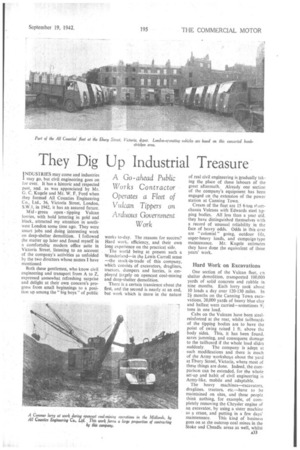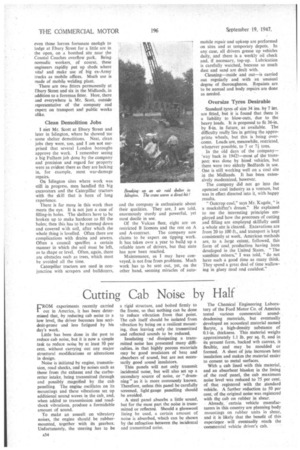They Dig Up Industrial Treasure
Page 43

Page 44

If you've noticed an error in this article please click here to report it so we can fix it.
A Goahead Public Works Contractor • Operates a Fleet of Vulcan Tippers on Arduous Government
Work
INDUSTRIES may come and industries a may go, but civil engineering goes on for ever. It has a historic and respected past, and as was appreciated by Mr. G. C. Kugele and Mr. W. F. Ford when they formed All Counties Engineering Co., Ltd., 36, Victoria Street, London, S.W.1, in 1942, it has an assured future.
Mid green open tipping Vulcan lorries, with bold lettering in gold and black, attracted my attention in southwest London some time ago. They were smart jobs and doing interesting work on deep-shelter demolition. I followed the matter up later and found myself in a comfortable modem office suite in Victoria Street, listening to an account of the company's activities as unfolded by the two directors whose names I have mentioned Both these gentlemen, who know civil engineering and transport from A to Z, expressed somewhat refreshing surprise and delight at their own concern's progress from small beginnings to a position up among the " big boys" of public works to-day. The reasons for success? Hard work, efficiency, and their own long experience on the practical side.
• The world being at present such a Wonderland—in the Leviiis Carroll sense —the stock-in-trade of this company, which consists of excavators, draglines, tractors, dumpers and lorries, is employed largely on opencast coal-mining and deep-shelter demolition.
There is a certain transience about the first, and the second is nearly at an end, but work which is more in the nature of real civil engineering is gradually taking the place of these labours of the great aftermath. Already, one section of the company's equipment has been engaged on the extension of the power station at Canning Town.
Cream of the fleet are 15 6-ton sortchassis Vulcans with Edwards steel tipping bodies. All less than a year old, they have distinguished themselves with a record of unusual reliability in the face of heavy odds. Odds in this c' se are " colonial " going, outdoor Ile, super-heavy loads, and campaign type maintenance. Mr. Kugele estimates they have done the equivalent of three years' work.
Hard Work on Excavations
One section of the Vulcan fleet, en shelter demolition, transported 100,000 yards of solid concrete and rubble in nine months. Each lorry took about 10 loads a day over 120-130 miles. In 24 months on the Canning Town excavations, 20,000 yards of heavy blue clay and ballast were carried—sometimes 9 tons in one load.
Cabs on the Vulcans have been steelreinforced at the rear, whilst tailboards of the tipping bodies are to have the point of swing raised 1 ft. above the body sides. This, it has been found. saves jamming, and consequent damage to the tailboard if the whole load slides suddenly. The company is adept at such modifications and there is much of the Army workshops about the yard at Ebury Street, Victoria, where most of these things are done. Indeed, the comparison can be extended, for the whole set-up and habit of civil engineering is Army-like, mobile and adaptable.
The heavy machines—excavators, draglines. tractors, etc.—have to be maintained on sites, and these people think nothing, for example, of completely removing the Chrysler engine of an excavator, by using a sister machine as a crane, and putting in a few days' maintenance. This kind of business goes on at the outcrop coal mines in the Stoke and Cheadle areas as well, whilst A33 even those lorries fortunate enobgh to lodge at Ebury Street for a little are in the open, on a bombed site near the Coastal Coaches overflow park. Being nomadic workers, of course, these engineers rapidly put up sheds where vita! and make use of big ex-Army trucks as mobile offices. Much use is made of mobile welding plant.
There are two fitters permanently at Ebury Street and six in the Midlands, in addition to a foreman fitter. Here, there and everywhere is Mr. Scott, outside representative of the company and expert on transport and public works alike.
Clean Demolition Jobs I Met Mr. Scott at Ebury Street and later in Islington, where he showed me some shelter demolitions. Neat, clean jobs they were, too, and I am not surprised that several London boroughs approve the work. I remember seeing a big Fulham job done by the company and precision and regard for property were as evident there as they are lacking in, for example, most war-damage repairs.
On Islington sites where work was still in progress, men handled tht big excavators and the Caterpillar tractors with the skill that is born of long experience.
There is far more in this work than meets the eye. It is not just a case of filling-in holes. The shelters have to be broken up to make hardcore to fill the boles; then this has to be rammed down and covered w;th soil, after which the whole thing is levelled. Often there are complications with drains and sewers. Often a council specifies a certain manner in which the soil Must be left, as to shape or level. Often, again, there are obstacles such as trees, which must be avoided all the time.
Caterpillar tractors are used in conjunction with scrapers and bulldozers, and the company is enthusiastic about their qualities. They are, I am told, enormously sturdy and powerful, yet most docile in use.
Of the Vulcan fleet, eight are on restricted B licences and the rest on A and A-contract. The company now claims to be expert on tipping work. It has taken over a year to build up a reliable team of drivers, but that state has now been reached.
Maintenance, as I may have conveyed, is not free from problems. Much work has to be sent out, yet, on the other hand, seeming miracles of auto
mobile repair and upkeep are performed on sites and at temporary depots.. In any case, all drivers grease Up vehicles daily, and there is a weekly oil check and, if necessary, top-up. Lubrication is carefully watched, because so much dust and sand are dealt with.
Cleaning—inside and out—is carried out regularly and with an unusual degree of thoroughness. Repaints are to be annual and body repairs are done as needed_
Oversize Tyres Desirable
Standard tyres of size 34 ins. by 7 ins. are fitted, but it is found that there is a liability to blow-outs, due to the heavy loads. It is proposed to fit 36-in. by 8-in in future, as available. The difficulty really lies in getting the appropriate wheels, but this is being overcome. Loads are, meanwhile, restricted, whenever possible, to 7 or 71 tons.
In the old days of the company— 'way back in 1942l—most of the transport was done by hired vehicles, but there were two elderly Bedfords in use. One is still working well on a coal site in the Midlands. It has been extensively modernized, however.
The company did not go into the opencast coal industry as a venture, but was in effect directed into it, with happy results.
"Outcrop coal," says Mr. Kugele, "is a muckshifter's dream." He explained to me the interesting principles employed and how the processes of cutting and filling are employed skilfully until a ,whole site is cleared. Excavations are from 20 to 100 ft., and transport is kept consistently at work.. American methods are, to a large extent, followed, this form of coal, production having been developed in the United States. "The sunshine miners," I was told, " do not have such a good time as many think. They spend a great deal of time wallowing in gluey mud and coaldust."












































































